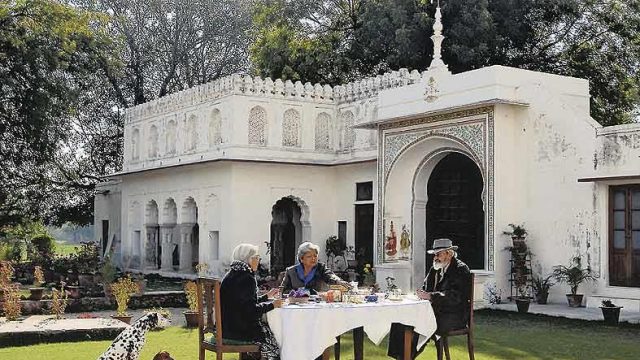Hundred rupees, Sat,” says Mamosa, his eyes twinkling behind his glasses. A sheepish Shatrujeet Singh, aka Sat, looks down at his bowl of dahi. I look inquiringly at Mamosa, or rather Mamu Sahib, Sat’s uncle Indrajit Deo and head of the Shahpura lineage. “When Sat and Jai were kids, we had a rule that anyone who spilled something on a fresh tablecloth had to pay a fine.” Across the table, Sheelu Maasi murmurs that it wasn’t kids but certain adults who did most of the spilling… We are breakfasting on the veranda at Nahar Niwas, the Shahpura residence, and gentle banter is very much a part of the menu.
Shahpura Bagh lies midway between Jaipur and Udaipur, an oasis of greenery and water, thirty acres of trees, fields and garden next to the spreading waters of Khirsagar and Pivnia reservoirs. It’s the home of a former royal family, entitled to a nine-gun salute no less, but the present generation lives with its past gracefully. Yes, there are the requisite hunting trophies on the walls, a snarling tiger and a stuffed pangolin, and the family’s intimate knowledge of wildlife probably comes from hours spent stalking ducks and geese and four-footed beasts, with a gun. But in the present, they are conservationists, trying to protect the wetlands around them, and growing organic vegetables in their home garden.
We earned our big and perfectly cooked breakfast, eggs and fruits, by waking at sunrise to go out on the lake in a row-boat, watching the thrilling sight of hundreds of water birds swoop and circle in formation as they settled into their winter quarters. The boat brought us close to groups of nakta or comb ducks, the strange horny growth on their bills clearly visible. Hot chai awaited us as we came ashore and the sense of well-being was complete.
Our hosts Sat Singh Rathore, a photographer by profession, his wife Maya, a tourism expert, and Sat’s brother, Jai, have recently opened up part of their family home and estate to paying visitors. There are only eight rooms for tourists. Meals are generally eaten with the family who also take visitors around the local attractions, of which there is quite an array. One quickly warms up to Indrajit Deo and his sisters Mridul Kumari (Sheelu Maasi) and Mahendra Kumari, Sat, Maya, and Jai as we trade funny stories, accounts of the escapades of princes in the past, discuss local cuisine and culture, and squabble about whether we saw a peregrine falcon or a merlin.
The personal touch that distinguishes Shahpura is everywhere: Maya, who also supervises the food, surprised us with a chocolate cake and champagne celebration one evening. To his red-faced delight, a guest found out that it was in honour of his birthday, something casually mentioned during the day but filed away in Maya’s busy brain. The champagne followed an unusual musical performance by a group of Bhils from the area. These were not the expected Langa, Manganiyar and Kalbeliya artistes who come from the desert districts but have now become a signature ‘Welcome to Rajasthan’ presence all over the state and abroad. The Bhils were more rustic, dancing for themselves and for the joy of it, rather than for an audience. When we left, they were still dancing.
Shahpura offers both nature and culture to its guests. Whatever they choose to do, the family makes it as enjoyable and effortless as possible. I passed up a visit to a renowned phad (scroll) painter, famous for his visual rendition of the epic of Pabuji, for a baser pleasure — shopping. Shivraj Singh, the assistant manager, accompanies me to a local cloth shop where the owner lays out yards of block-printed cotton, describing which community wore what. Did I want the ghagara Jat women wore or the Meenas or the Bhils? My choice made, there ensues a discussion on the best tailor to do the job in a day. Someone described only as Pappu ki Ma finds some favour, but ultimately it is next-door Shakeelbhai who measures me and delivers the ghagara as promised the next day. I wear it to dinner, happily twirling around and showing off to polite applause.
Exploring the town, with its ruined old palace, stepwell and temples jostling for space alongside PCO booths and petrol stations, makes for a good change of tempo. The surrounding countryside is waiting to be explored too. We set off one morning in a weathered 1952 Willys jeep to nearby Nahar Sagar lake. We drive along the embankment of the lake, water on one side and green fields on the other, watching birds, and stop for a picnic at the family farm, a sprawling space with massive old trees, a quiet retreat from urban life.
The farm and the estate have a charming overgrown quality. A jewel of a guesthouse — Umaid Nivas — nestles amidst the woodland and fields, close to the main home. Its six rooms are huge — high ceilings and gleaming lime floors (not limestone, but lime, using a painstaking local technique), four-poster beds and enormous bathtubs. The effect is spacious and serene.
On our last evening, we set out for the partly ruined Dhikola Fort, lately used to run a village school and now back with the family. Sat and Jai tell us their plans, about the American guests who want to use the fort as a setting for a special dinner for four. Thus does Rajasthan’s crumbling heritage find a new lease of life.
Back at the Bagh, we sit down to another lavish dinner, crowned by delicious chikoo ice-cream, churned in a bucket. I shouldn’t have another helping but I succumb. “Visit us in summer,” says Maya, “and we’ll give you mango ice-cream.” By now, the Shahpura family feels like old friends and the thought of coming back, in mango season, suddenly makes summer something to look forward to.
Tariff Rs 9,450–10,850, inclusive of breakfast Contact 01484-222013, shahpurabagh.com




